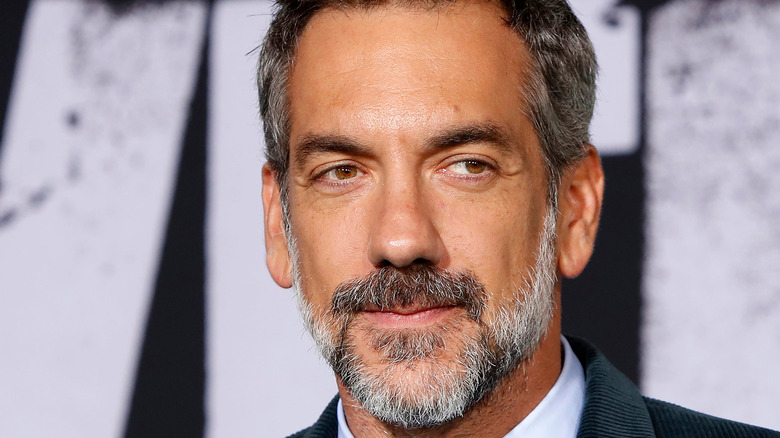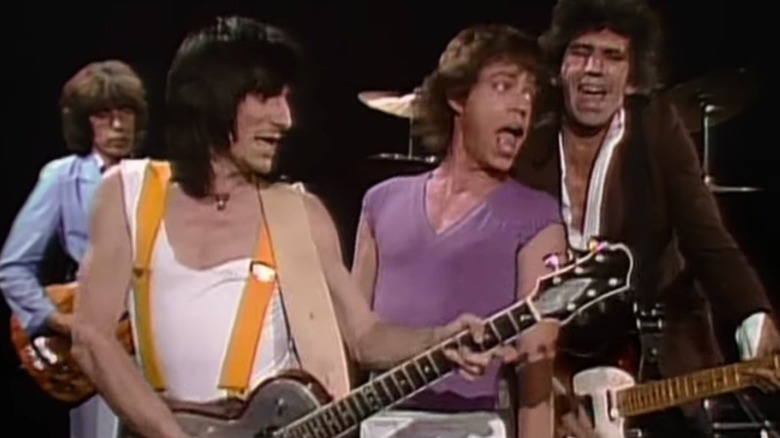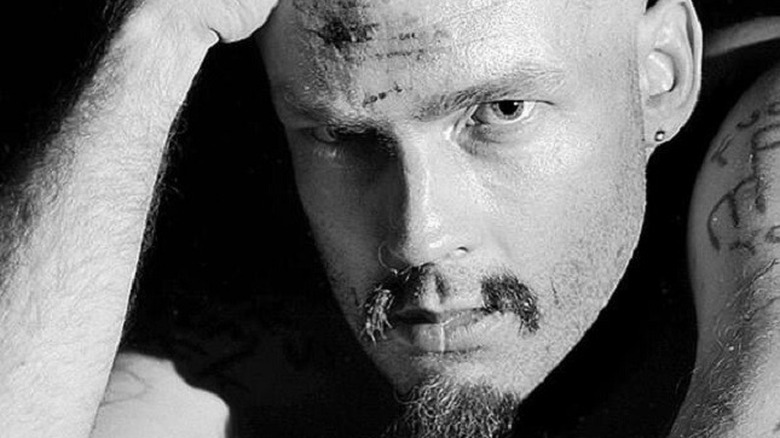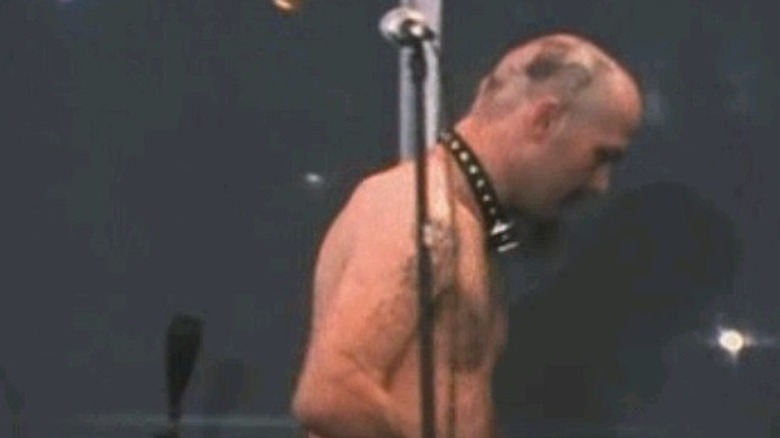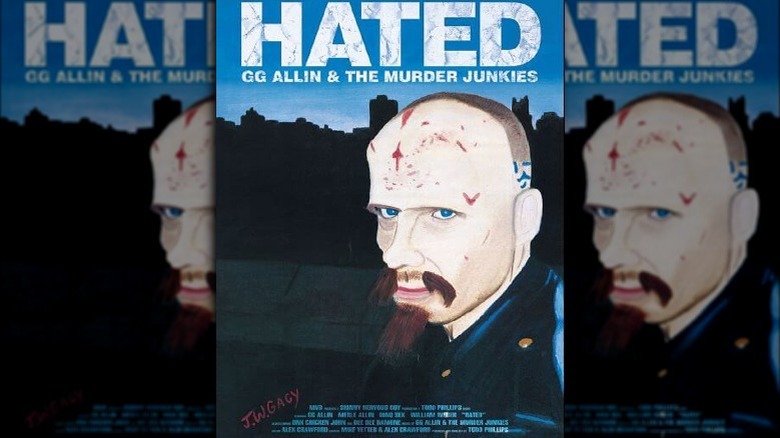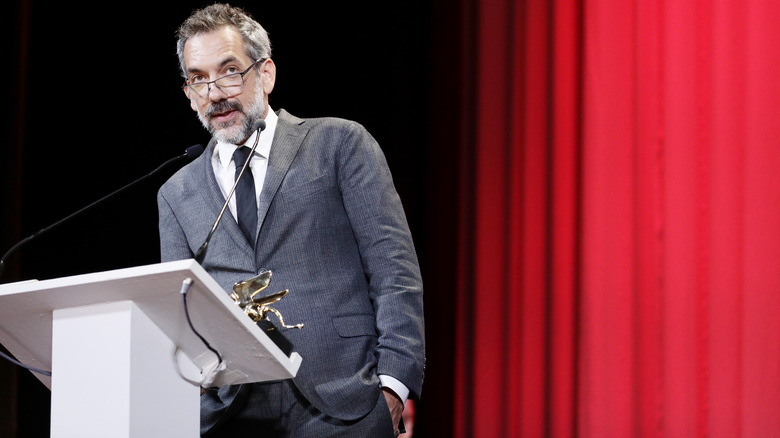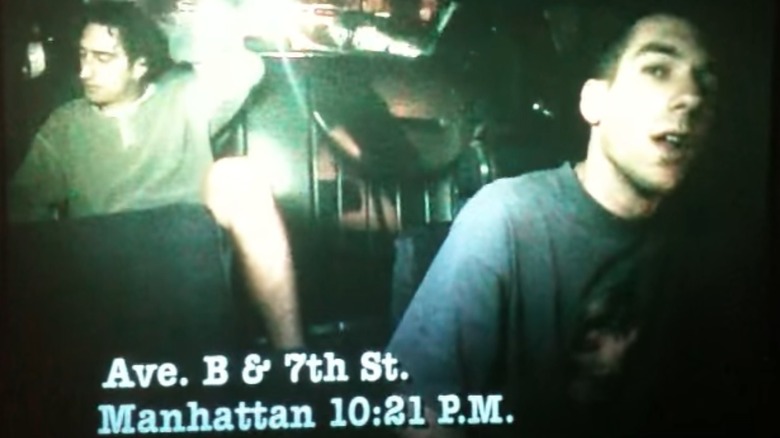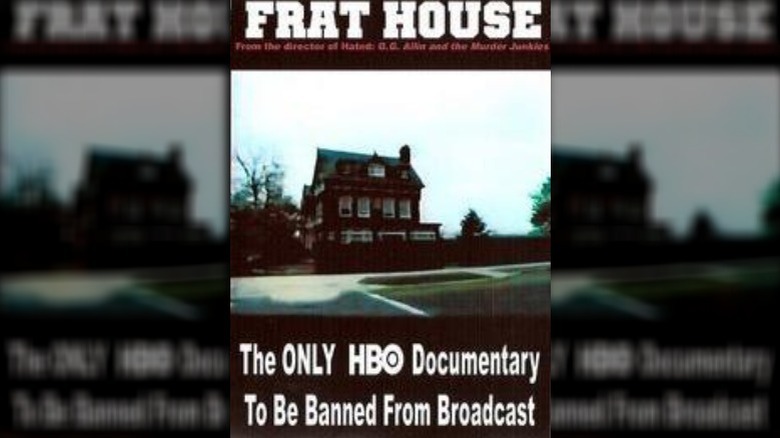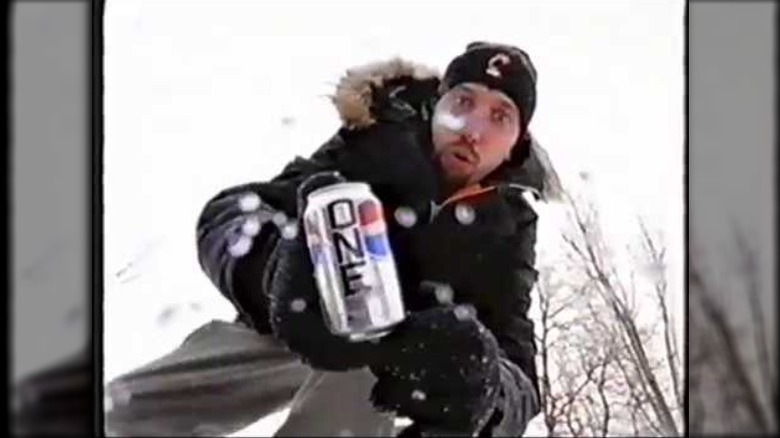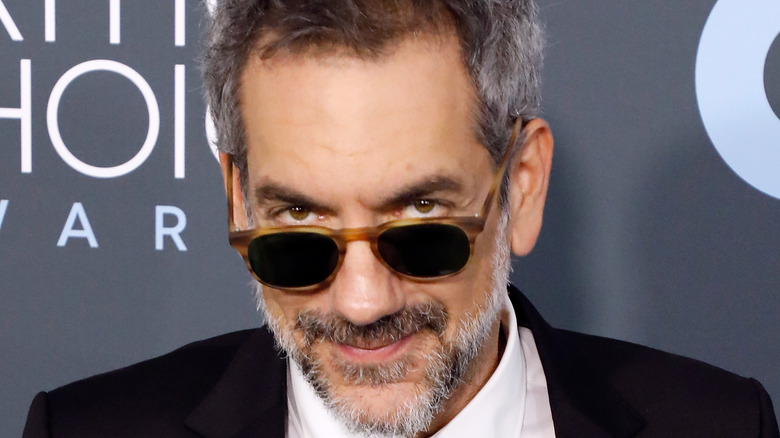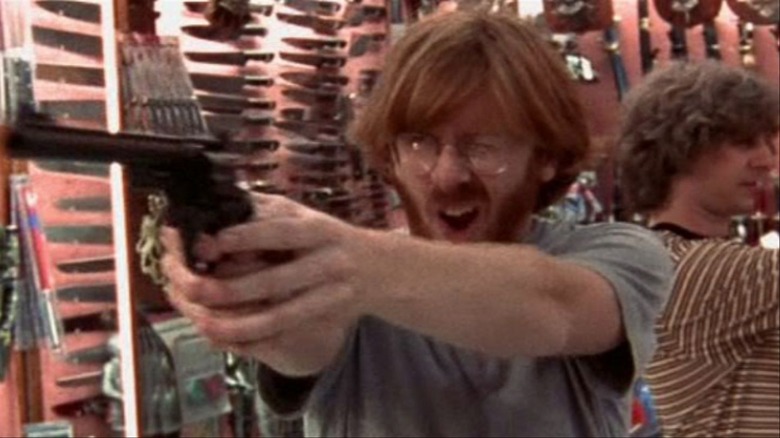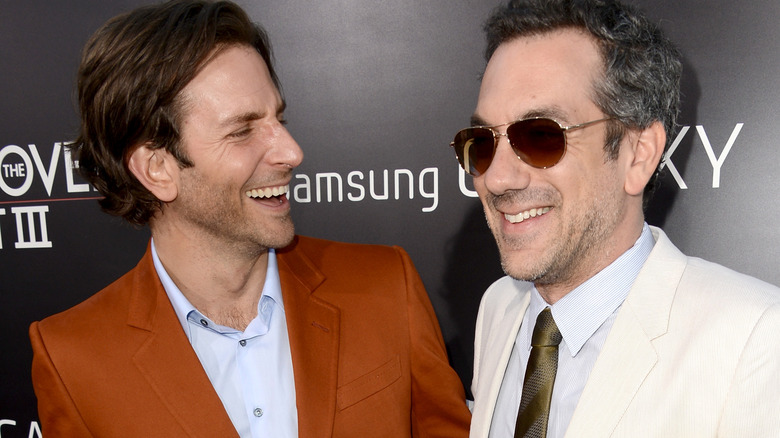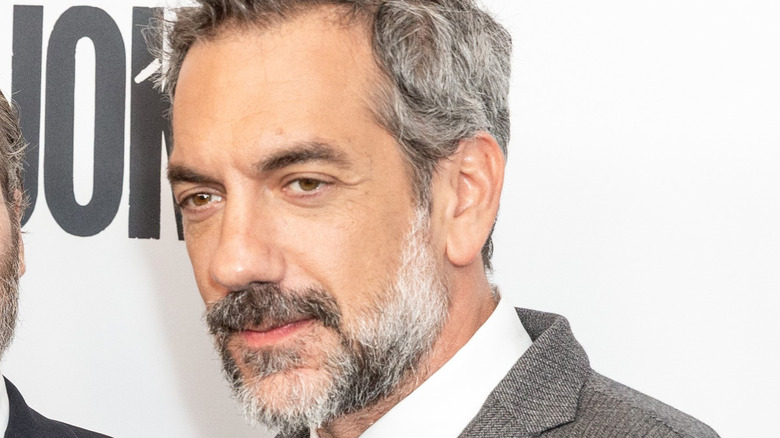The Untold Truth Of Todd Phillips
Since 1993, Todd Phillips has directed and produced films spanning many genres, and is as fascinating as the larger-than-life characters in his films. He is most known for films like his blockbuster comedy "Hangover" trilogy, which smashed records at the box-office while throwing eager audiences into hysterics. Phillips earned renown again with his conception of DC's most notorious villain in 2019's "Joker." His lesser-known works are as engaging to watch as his major releases, especially the first three documentaries which established the foundation of his career.
On the surface, his many works seem to be vastly different from one another, but underneath lies hidden themes interconnecting their seeming disparate nature. From punk rock and serial killers, to the depths of depravity in rituals like college hazing and party life, to dark comedies and behind-the-scenes encounters, Phillips is fascinated by the darker aspects of humanity, society, and excess. Join us as we unravel the unseen threads that make Todd Phillips.
His roots as a filmmakter
From an early age, Phillips exhibited a passion for telling stories through film, especially those which delve into the mechanics of societal norms and fame. He cites the Rolling Stones documentary, "Gimmie Shelter" as one of his primary influences for becoming a director, telling DVD Talk it's "one of the best movies ever made." Phillips shared the impact it had on him as a child to IndieWire "I didn't know how movies were made, I didn't know anybody in the movie business, but I saw the editing room and that was when I decided I wanted to be a filmmaker."
According to an interview with The Morning Call, young Phillips was also influenced by the documentaries of English director Nick Broomfield, who is most known in the US for the controversial films "Kurt & Courtney," and "Biggie & Tupac."
Phillips also stated in Interview Magazine that he got into "filmmaking through photography," and one of his earliest works was a collection of photographs he took of some of his friends from high school up to no good, "like taking drugs, doing vandalism." The set was included as part of his application to NYU, setting the tone for his future subjects and projects.
Finding a voice through documentaries
Phillips revealed to IndieWire he felt daunted by the concept of writing a script while in college, with so little life-experience to contribute to such a massive creative endeavor. So, he chose to make documentaries until he'd gathered enough of his own ideas, using the medium to "fast-forward through the filmmaking process." His first project, "Hated," examines the extreme life and death of the incredibly controversial punk rock performer, GG Allin.
Allin is the epitome of truth being stranger than fiction: He was born with the legal name "Jesus Christ Allin," into a reclusive family living in a log cabin without electricity or running water, run by a father who used to dig graves for the family while threatening to kill them. It seems Allin may have survived his childhood, but could never fully escaped the demons he encountered during that time of "violence and sickness." He grew to have an insatiable appetite for sex, drugs, and violence, and made a name for himself with bizarre performances of self-mutilation, defecating on-stage, and verbally and physically abusing his audience.
The punk rocker was on probation at the time Phillips queried him about the documentary, but it didn't take much to persuade him to violate it by coming to New York for the film. Allin straight up skipped parole and drove to New York to meet Phillips.
GG Allin at NYU
While filming Allin in New York, Phillips arranged for a live performance at the Loeb Student Center at NYU. According to a post-film screening Q&A with the director, this idea was hatched under the guise of a "spoken word" performance a la Henry Rollins of "Black Flag," who had just held a successful performance on campus a month prior. However, the prestigious college was about to get a presentation far more extreme than private thoughts from road diaries or anarchist observations about government and society.
According to IndieWire, the evening of Allin's performance was "Hawaiian Night," and someone brought fruit, including bananas, into the Loeb Center. In true GG fashion, he stripped down to his cowboy boots and proceeded to violate the banana, then tossed remnants into the shocked crowd. Perhaps the craziest part of this whole affair is he peeled the banana before violating it — or violating himself, or both, depending on your perspective.
Allin then demanded the remaining audience members remove at least one piece of clothing and place it before him on stage, like a sort of twisted offering. The remaining audience members left in droves instead, and enraged authorities came in and broke up the crazy show. Allin had to sign a letter stating he would leave peacefully and never return to the campus, and Phillips got in major trouble with the dean of faculty, revealing in the Q&A he was lucky to continue his education after that point.
John Wayne Gacy contributed to "Hated"
GG Allin was also pen pals with none other than serial killer John Wayne Gacy, who assaulted and murdered at least 33 young men and boys, and was on death row at the time "Hated" was being made. When Phillips learned of this bizarre relationship between Allin and the "Killer Clown," along with Gacy's artistic inclinations, he wrote to Gacy in prison commissioning him to paint the poster for the documentary. According to Phillips at a post-screening Q&A, Gacy was willing to oblige for $50, along with a "compromising" photo of Phillips.
Phillips obliged to this strange, yet meager sum, and in return, Gacy painted 1,000 posters for him. In order to offset film costs scattered across several major credit cards, Phillips sold the posters out of the backs of magazines for about $15 each. As Phillips explains it, this technically makes Gacy the executive producer for "Hated," which seems fitting for such a horrifically cartoonish character.
Gacy contributed to the documentary in other ways as well, as the film opens with a quote from the late serial killer: "GG Allin is an entertainer with a message to a sick society. He makes us look at it for what we really are. The human is just another animal who is able to speak out freely, to express himself clearly. Make no mistake about it, behind what he does is a brain." It's easy to see how Phillips would become interested in a character like the Joker nearly two decades later.
His controversial advice at NYU
Phillips experienced controversy on the campus of NYU again nearly a decade later. In 2009, while riding the success of his then-recent blockbuster, "The Hangover," the director was invited to guest lecture at the college. With the scope of experience he'd gained since having to drop out of NYU as a student while making "Hated," one would assume he'd have a wealth of insight to contribute about the filmmaking process.
Unfortunately, the final results reported by Vulture couldn't have wound up further from that assumption. During one of his stories, Phillips claimed that he acquired equipment during his student days by falsely stating that his equipment was stolen, thereby scamming the insurance company.
Naturally, the campus was furious with their former student encouraging insurance fraud, especially considering NYU was already struggling with burgeoning insurance costs at the time. Following Phillips' short-sighted lecture, a letter was sent out to students stating they were "appalled" by the director's behavior, and condemned any similar acts by others on their campus. It's one thing to film extreme antics, it's another entirely to violate school property and falsify insurance claims.
His time on Taxicab Confessions
After completing his first two documentaries, Phillips went on to expand his work experience, landing a gig as an intern for HBO in the mid-nineties. During his time there, he cut his teeth as a driver and field producer for a TV show praised for being one of the original reality TV series — "Taxicab Confessions."
Phillips shared with "Details" (which is now "GQ Style") how he got picked to be on camera, explaining he was selected because HBO was in need of English-speaking drivers who were skilled at coercing strangers into sharing intimate details about their personal lives. "So I got my hack license and did the show in New York. It was thrown out of the city after I asked a guy who wouldn't talk to get out of my cab."
This later statement couldn't be corroborated, as (via The Boston Globe) the New York Taxi & Limousine Commission (under then-mayor Rudy Giuliani) thought the show was "too Hard-R" and were denied a permit "under the guise that it wasn't safe" — not because one of the drivers ejected a silent guest from his cab. The show was later brought back to New York in 2005, much the delight of fans everywhere.
His documentary on frat house hazing
Phillips' next work was another documentary, "Frat House," which he co-created with his friend Andrew Gurland in 1998. It examined the extremes of secretive college hazing rituals, with the two bookish filmmakers immersing themselves in fraternity life for a year. During that time, Phillips and Gurland experienced everything "Hell Week" and beyond had to offer. At first, they shadowed New York's Beta Chi fraternity, headed by a madman nicknamed "Blossom," who was the self-proclaimed "King of the School," and the walking definition of toxic masculinity.
Aspiring members tolerated all manner of physical, mental, and emotional abuse from Blossom. Ultimately, this frat cut ties with Phillips and Gurland before they could complete the film, claiming the camera was making the pledges uncomfortable. This forced the pair to hunt for another group of willing participants, which proved far easier said than done. Finally, they gained the trust of Alpha Tau Omega in Muhlenberg College, Pennsylvania, on the condition the school and frat would remain anonymous.
There was also one other stipulation — Phillips and Gurland had to agree to join the pledges in their ordeals. Things got so extreme that Phillips wound up locked in a dog cage, covered in spit, ashes, and various liquids, and Gurland had to be hospitalized due to stomach pains.
Banned by HBO
Phillips and Gurland's ordeals paid off: They not only completed the grueling, ten-week hazing process, "Frat House" was considered groundbreaking for the previously unseen access it provided into the secretive world of fraternity life. The film was given wild reception at the Sundance Film Festival in 1998, and was awarded the Grand Jury Prize. This attention got the film picked up by HBO, but unfortunately, it never aired.
Instead of the success it might have been, "Frat House" was quietly shunted aside after allegations came out against the filmmakers, claiming (via EW) that some of the hazing scenes had been staged. Parents concerned about their children's futures also questioned the legitimacy of waivers signed by young adults while drunk and stoned. Phillips has denied the allegations in interviews with publications like Vice, claiming the film was pulled because it depicts upper-class white kids doing despicable and illegal things.
Phillips has since tried buying the film back from HBO, but he told The Austin Chronicle the company refuses to acquiesce, which has transformed this Sundance award-winner into a sought-after cult classic with very few copies in circulation. We can tell you firsthand, "Frat House" is as disgusting and engrossing as it sounds.
Todd Phillips, Scot Armstrong, and Tom Green
After his first three documentaries, Phillips expanded into the world of marketing, and it was through these projects he cultivated some of his most important creative relationships. As writer Scot Armstrong explained it to GQ, he was also working in advertising at the time, and was a huge fan of "Hated," so he hired Phillips to direct a commercial. In addition to sharing a love of filmmaking, the two creatives also shared a love of comedy — Armstrong was working with both the Upright Citizens Brigade and Improv Olympic. As a result, Armstrong and Phillips hit it off, going to work together on films including "Road Trip," "Old School," and "The Hangover Part II."
Speaking of "Road Trip," Phillips revealed to DVD Talk he also met another pivotal person in his career while filming commercials — the one and only Tom Green. Green was a sort of spokesperson for Pepsi One, going around to various locations promoting the new diet soda in wild and attention grabbing ways. Armed with a megaphone and endless amounts of Pepsi One, Green's antics enthralled everyone around him, and Phillips found his next muse.
When he was approached by legendary producer and director Ivan Reitman to pitch an "Animal House-on-the-road" movie, Phillips called on Armstrong to help him write it, and wrote Green's role as the oddball Barry specifically for him. Thus, Phillips made the successful transition from small-time documentaries to the big-time box-office.
Getting 300 phone calls due to a cola ad
Pepsi wasn't the only soda company Phillips made commercials for in his early years. In 1998, Virgin Group Empire waged war against Big Cola with the launch of Virgin Cola, and Phillips was hired to direct commercials for the new cola on the block. Virgin featured ordinary people saying whatever they wanted in their commercials while standing on a red plastic crate branded with the cola's logo and tagline.
Phillips himself was seen on the red crate, using it as an opportunity to pitch a national singles ad, as shared in The Wall Street Journal. Casually clad in jeans, the upstart director looked into the camera: "Hey, I'm Todd. I'm single. I make about 35K a year, and I love to hike," followed by his real phone number.
He returned home to a reported 300 messages from "a lot of hot-sounding girls," and even a few guys just looking to hang out, but it seems all the attention made Phillips uncomfortable. When queried by the WSJ about returning any of the voice-mails, he replied, "Are you kidding? I'm not gonna call any of these people. They're weird." Despite this let down, Phillips turned out to be a proper ladies' man, going on to later date stars like Paris Hilton before meeting his lovely wife, Alexandra Kravetz.
The Phish documentary
Phillips also made another documentary while working on "Road Trip," which goes to show how devoted he is to his craft. Phillips followed the band Phish for a year while they toured from Europe to the US, culminating with scenes from the legendary "Great Went” concert in Limestone, Maine in August 1997. Dubbed the "Bittersweet Motel," in honor of one of the band's songs, the film is praised for its excellent concert footage, as well as for keeping its primary focus on the band, rather than the notorious fans known as "Phish-heads" who follow the concert circuit en masse.
Many of these peace-and-love types were shocked to see band members walk into a gun store in Spain, complete with lead guitarist and singer Trey holding a massive revolver while shouting obscenities like some black-hat sheriff. Phillips gushed over the experience to DVD Talk, saying, "It was so much fun because we were working with 48 track live concert recordings. It was just amazing."
According to MTV, Phillips was chosen for the project partly due to the fact he wasn't an existing fan of the group, in an effort to provide as much an unbiased perspective as possible. However, by the time the film wrapped, he had grown into both an avid fan and close friend of the epic jam band.
His partnership with Bradley Cooper
During production of "The Hangover," Phillips and star Bradley Cooper formed a close friendship — one deepened by their work on the sequels. The two later formed a production company named named "Joint Effort Productions." Under Joint Effort, the dynamic duo secured a three-year first-look deal with Warner Bros., going on to produce hit films, "War Dogs," "A Star is Born," and "American Sniper."
Cooper even helped Phillips behind-the-scenes with "Joker," providing support and feedback from conception to post-production. The film's editor, Jeff Groth, praised Cooper's editing skills in an interview with Collider, "He doesn't miss a thing ... He was definitely a huge help. I think he got a lot more experience in editing than most people would realize." It will be great fun to continue riding along with this dynamic duo, and see what future projects Todd Phillips has up his sleeve.
His claims about "woke culture"
It can be assumed that a director who makes his name in comedies would transition into creating a much darker film like "Joker" because it would present a challenge, or maybe due to a lifelong love of the character. Unfortunately, according to an interview Phillips conducted with Vanity Fair, he had a very different reason for becoming involved with such a project. Phillips complained about the changes taking place in current society, claiming comedy is dead due to modern-day political correctness.
"Go try to be funny nowadays with this woke culture ... It's hard to argue with 30 million people on Twitter. You just can't do it," Phillips told Vanity Fair. "So I go, 'How do I do something irreverent ... Oh I know, let's take the comic book movie universe and turn it on its head with this.' And so that's really where that came from." Stand-up comedian and actor, Marc Maron, who has a cameo as a producer on the fictional show "Live! With Murray Franklin" in "Joker," shot back at the director's remarks in an episode of his "WTF" Podcast.
"There's plenty of people being funny right now," said the snarky comedian. "It's no excuse ... If you're too intimidated to try to do comedy that is deep or provocative, or even a little controversial, without hurting people, then you're not good at what you do. Or maybe you're just insensitive." Hopefully, Phillips will learn to be a bit more sensitive in the future.
